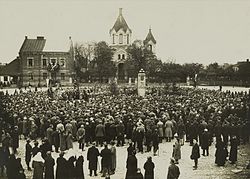boletus
11 Nov 2012
Genealogy / Fijalka - born in Izdebki (around 1880) Poland; general history with family names possible? [5]
Please notice that this data came from a Carpato-Rusyn webpage, which by definition is focused on £emkos and Greek-Catholic religion, not on Poles and and Roman-Catholic religion. This is simply a case of missing data, not missing people. :-)
Generally no, but Fijałka "sounds" Polish. :-) The same Carpato-Rusyn webpage lists 27 £emko surnames from Izdebki, cited by Krasovs'kyj from 1787 Austrian Cadastral Records. There is no Fijałka among them. But there are only few that do not sound Polish, while the rest could be either Polish or £emko. Worth to examine.
Yes and no. If the surname was of adjective form, such as Fijalski, than it would indicate a masculine form, while Fijalska would be be a female surname. However, in noun based surnames everything goes and both "Fijalka" and "Fijalek" would serve for both females and males. Nowadays you just say: Pan Fijalka and Pani Fijalka. (Mr. and Mrs.) Until 1950s or so the old fashioned naming was used for women:
Fijalka => a man
Fijalkowa => his wife
Fijalkówna => his daughter
You surname, plus about its 40 variations, come from the word "violet"; in Polish FIO£, FIO£EK (diminutive), old spelling FIJO£, FIJA£, CHWIO£EK (also from chwiać, to rock)
Spelling: Here are two spelling rules worth underlining:
1. Both FIJA- and FIA- come from the same root; the former is an ancient spelling, the latter - the modern one.
2. There are two variations of L used here: a regular L and a so-called dark L (£), a.k.a. L with stroke. People from Kresy (Eastern Borderlands) know how to pronounce the £ properly. Unfortunately most Poles pronounce it as English W, rather than the actual £. Before and shortly after WWII, educated people, especially speakers and actors, etc. knew how to say it properly too.
Here are several groups of related surnames, separated by spellings:
A. Fial, Fiala, Fialik, Fialkowski, Fialski
B. Fiał, Fiała, Fiałek, Fiałka, Fiałkiewicz, Fiałko, Fiałkowicz, Fiałkowski (since 1783, from village Fijałkowo, Ostrołęka county), Fiałków, Fiałowicz, Fiałowski
C. Fijal, Fijala, Fijalik, Fijalkowski (since 1783, from village Fijałkowo, Ostrołęka county), Fijalow, Fijalski
D. Fijał, Fijała, Fijałczuk, Fijałek, Fijałka, Fijałkiewicz, Fijałko, Fijałkowicz, Fijałkowski (since 1783, from village Fijałkowo, Ostrołęka county), Fijałków, Fijałło, Fijało, Fijałowicz, Fijałowski
The "cichociemny" Michał Fijałka is spelled with £. "Moi Krewni" program is very sensitive regarding the rules of spelling, since - being based on a German software - it does not make any assumptions regarding Polish linguistic rules. Hence it shows 156 FIJA£KA surnames, but ZERO FIJALKA surnames.
At the moment I cannot say anything definitive about Sopel surname. It could be a £emko (or generally Rusyn) name, considering its concentration at that corner of Poland. Slovakian? I am just guessing: no.
From 1840 to 1936, there seems to be only Greek Catholic people. Is that possible? Or does it mean that we don't have anymore the records of the Roman Catholic and Jewish persons? What would be the reason?
Please notice that this data came from a Carpato-Rusyn webpage, which by definition is focused on £emkos and Greek-Catholic religion, not on Poles and and Roman-Catholic religion. This is simply a case of missing data, not missing people. :-)
As to the mixed population, this is also quite interesting. Is there any possible way to know to which religious path they belonged?
Generally no, but Fijałka "sounds" Polish. :-) The same Carpato-Rusyn webpage lists 27 £emko surnames from Izdebki, cited by Krasovs'kyj from 1787 Austrian Cadastral Records. There is no Fijałka among them. But there are only few that do not sound Polish, while the rest could be either Polish or £emko. Worth to examine.
I also have one kind of "linguistic" question. I heard that "Fijalka" was the feminine form of "Fijalek" and that men normally bear the second version of the name. So if we stick to this information, in my case, the family name remained "Fijalka" because they were recorded by people who did not speak Polish, so they would have kept the Femine form of the name.
Yes and no. If the surname was of adjective form, such as Fijalski, than it would indicate a masculine form, while Fijalska would be be a female surname. However, in noun based surnames everything goes and both "Fijalka" and "Fijalek" would serve for both females and males. Nowadays you just say: Pan Fijalka and Pani Fijalka. (Mr. and Mrs.) Until 1950s or so the old fashioned naming was used for women:
Fijalka => a man
Fijalkowa => his wife
Fijalkówna => his daughter
You surname, plus about its 40 variations, come from the word "violet"; in Polish FIO£, FIO£EK (diminutive), old spelling FIJO£, FIJA£, CHWIO£EK (also from chwiać, to rock)
Spelling: Here are two spelling rules worth underlining:
1. Both FIJA- and FIA- come from the same root; the former is an ancient spelling, the latter - the modern one.
2. There are two variations of L used here: a regular L and a so-called dark L (£), a.k.a. L with stroke. People from Kresy (Eastern Borderlands) know how to pronounce the £ properly. Unfortunately most Poles pronounce it as English W, rather than the actual £. Before and shortly after WWII, educated people, especially speakers and actors, etc. knew how to say it properly too.
Here are several groups of related surnames, separated by spellings:
A. Fial, Fiala, Fialik, Fialkowski, Fialski
B. Fiał, Fiała, Fiałek, Fiałka, Fiałkiewicz, Fiałko, Fiałkowicz, Fiałkowski (since 1783, from village Fijałkowo, Ostrołęka county), Fiałków, Fiałowicz, Fiałowski
C. Fijal, Fijala, Fijalik, Fijalkowski (since 1783, from village Fijałkowo, Ostrołęka county), Fijalow, Fijalski
D. Fijał, Fijała, Fijałczuk, Fijałek, Fijałka, Fijałkiewicz, Fijałko, Fijałkowicz, Fijałkowski (since 1783, from village Fijałkowo, Ostrołęka county), Fijałków, Fijałło, Fijało, Fijałowicz, Fijałowski
The "cichociemny" Michał Fijałka is spelled with £. "Moi Krewni" program is very sensitive regarding the rules of spelling, since - being based on a German software - it does not make any assumptions regarding Polish linguistic rules. Hence it shows 156 FIJA£KA surnames, but ZERO FIJALKA surnames.
At the moment I cannot say anything definitive about Sopel surname. It could be a £emko (or generally Rusyn) name, considering its concentration at that corner of Poland. Slovakian? I am just guessing: no.
 PolishForums LIVE / Archives [3]
PolishForums LIVE / Archives [3]

